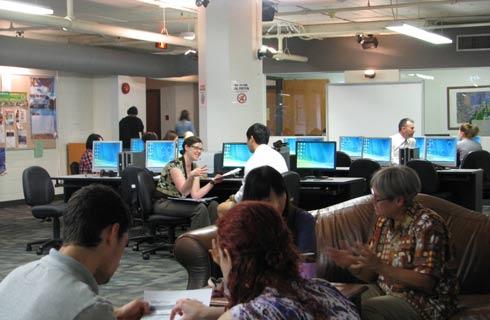Master of Science in Human Language Technology

学历文凭
Masters Degree

专业院系
Department of Linguistics

开学时间

课程时长

课程学费

国际学生入学条件
IDP—雅思考试联合主办方

雅思考试总分
7.0
- 雅思总分:7
- 托福网考总分:79
- 托福笔试总分:550
- 其他语言考试:Pearson PTE Academic (link is external) - minimum score of 60
CRICOS代码:
申请截止日期: 请与IDP联系 以获取详细信息。
课程简介
相关申请
 预科
预科 奖学金
奖学金 实习机会
实习机会 在校学习
在校学习 跨境学习
跨境学习 校园授课-线上开始
校园授课-线上开始 在线/远程学习
在线/远程学习
开学时间&学费
学费信息仅供参考,请与IDP联系以获取详细信息
| 开学时间 | 时长 | 学费 | 地点 |
|---|
学校排名

世界排名159
数据源:
泰晤士高等教育世界大学排名
关于亚利桑那大学

亚利桑那大学成立于1885年,拥有来自130多个国家的55000多名学生。亚利桑那大学是一所真正的国际化大学,致力于帮助学生应对现实世界的挑战。在亚利桑那大学,国际学生能够找到改变人生的大学之旅所需的一切,无论是课堂内外。亚利桑那大学一共有22个学院,65个以上研究中心和实验室。150多个本科学位、200个研究生学位和100个博士学位专业供学生选择,专业涵盖的学科领域从艺术和天文学到创业学、工程和社会科学等不一而足。校园内设有四个宿舍区,包括23栋独特的宿舍楼。学生可以从600多个学生俱乐部和组织中进行选择,涵盖从个人兴趣爱好到职业导向和专业团体等各种活动。亚利桑那大学位列全球大学前1% (2024年世界大学排名中心),其研发支出位列全美大学前4%(2024年美国国家科学基金会)。学生将受益于基于最新信息和研究突破的卓越教学质量。校园活动丰富多彩,拥有两个康体设施、多个体育场、运动场以及各种各样的餐饮场所和餐厅。作为亚利桑那野猫,校园的精神和自豪感感染着20多支一级联赛运动队。除了课堂之外,学校还支持学生在所选领域和未来职业发展中取得卓越成就。许多学位课程包含实习,并鼓励一年级学生参与开创性的研究。所有学生都有机会从学生参与和职业发展办公室获得职业支持和指导。图森市经济蓬勃发展,为学生提供了大量寻找合适职业的机会。
本校相关课程

Bachelor of Arts in Sociology
学历文凭
Bachelor Degree
开学日期
课程费用总额


Bachelor of Science in Public Management and Policy - Environmental Policy
学历文凭
Bachelor Degree
开学日期
课程费用总额


Bachelor of Arts in Political Science - American Politics
学历文凭
Bachelor Degree
开学日期
课程费用总额


Bachelor of Arts in Philosophy - Ethics
学历文凭
Bachelor Degree
开学日期
课程费用总额


Bachelor of Arts in Linguistics - Academic/Professional Linguistics
学历文凭
Bachelor Degree
开学日期
课程费用总额


Bachelor of Arts in Latin American Studies
学历文凭
Bachelor Degree
开学日期
课程费用总额

其他相关课程

安大略大学机械工程技术高级文凭-机器人与自动化(可选合作公寓)
 康尼斯托加理工学院
康尼斯托加理工学院学历文凭
Bachelor Degree
开学日期
课程费用总额


机电工程技术高级文凭“自动化和机器人技术(可选合作社)
 百年理工学院
百年理工学院学历文凭
Bachelor Degree
开学日期
课程费用总额


机电工程技术员文凭-自动化和机器人
 百年理工学院
百年理工学院学历文凭
Bachelor Degree
开学日期
课程费用总额


安大略大学机器人与工业自动化研究生证书(合作社)
 康尼斯托加理工学院
康尼斯托加理工学院学历文凭
Graduate Certificate
开学日期
课程费用总额


机电和机器人文凭
 不列颠哥伦比亚理工学院
不列颠哥伦比亚理工学院学历文凭
Bachelor Degree
开学日期
课程费用总额


计算机基础证书
 德恒学院
德恒学院学历文凭
Bachelor Degree
开学日期
课程费用总额










 美国
美国